By Bright Kwaku Azumah (BA, MBA)

In today's globalized world, the need for swift and secure payments of goods and services has become more important than ever.
SWIFT payments have emerged as a reliable and e cient way to make payments within and across borders, and they have become a preferred option for many consumers and businesses alike.
In 2020, the World Bank established that the implementation of the African Continental Free Trade Area (AfCFTA) has the potential of growing African exports by $560 billion while increasing Africa’s income by $450 billion by 2035. A treaty that is going to connect approximately 1.3 billion people across 55 African countries with a combined GDP of $3.4 trillion.
Jospong Group, Komptec in 30m Euro partnership to boost rice production in Ghana
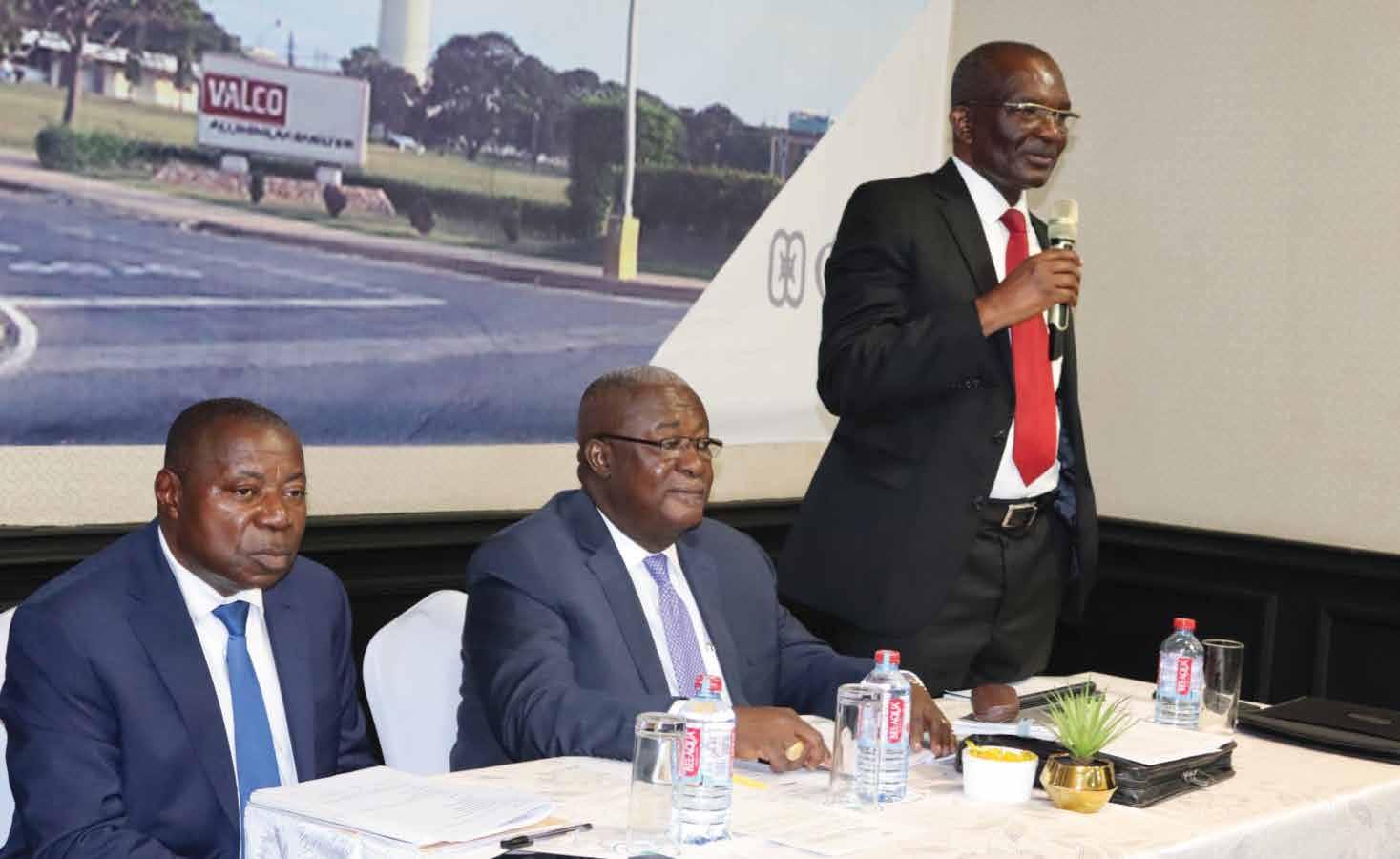
Boosting Inter- national Trade: How SWIFT payments empower SMEs for AfCFTA Trade Min calls for reform at WTO to benefit developingcountries
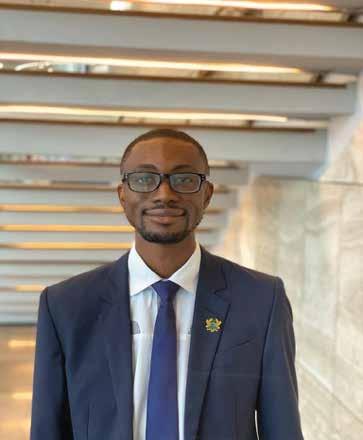
Ghana’s Minister for Trade and Industry, Kobina Tahir Hammond, is calling for an enhanced capacity for developing countries to enable them participate e ectively in WTO negotiations and thereby bene t from the Multilateral Trading System. The minister also wants the restoration of a fully functional two-tier dispute settlement mechanism -Panels and the Appellate Body to give the multilateral trading system (MTS) the needed predictability and certainty. Additionally, he is pressing for improving the transparency of governments' trade measures, especially as it pertains to export prohibitions and restrictions as witnessed during the height of the COVID crisis, As part of the measures to reform the Organisation, the minister is again advocating positively reviewing the “special and di erential” treatment for developing countries
Valco seeks strategic investor by close of year
Exploring export opportunities in the world’s biggest market
economy due to its enormous manufacturing capabilities. As factual as this may be, China’s sheer population makes it an alluring destination for exporters.
With a current population of over 1.4 billion, representing 18.47% of the total world population, China is no doubt the most populous nation in the world with an estimated working population of 733.5 million larger than US and Europe combined.
nities that lie in China’s market.
According to Statista’s market data, China’s value of imports is estimated around 2.72 trillion in 2022, making it the second largest importing country worldwide as well as the largest trade destination in the world and an import hub for exports.
Imagine having 1.4 billion mouths to feed, and an unending duty to produce for the world to consume.
and recently cassava.
China is also estimated to be the largest consumer economy and expected to grow by 25% more than the global consumer growth rate. As incomes of China’s working increases so will the purchasing power increase. This will have a signi cant e ect on the global economy in consumer market.
Conventionally, the narrative around China frames the country as a predominantly export based
It is also reported that only about 11% of China’s population is considered middle class with less than about 2% of its workforce being able to pay income taxes. This shows the unending opportu-
The demand for products is diverse and enormous ranging from crude oil, gold, iron ore, copper, petroleum gas, agricultural products such as soya beans, oils, cashew, cotton barley, rubber, fruits, vegetables, dairy products
What this data implicitly tells us is that if you produce and it meets the required standard, China will consume. It is therefore critical that countries that are looking at scaling their export industries and boosting economic growth have to seriously consider the import potential of China. Ghana, for example, can posi-
&
– Adelaide Agyepong predicts

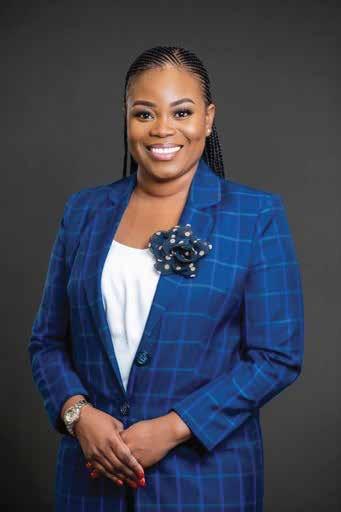
Conventionally, investors around the world are primarily motivated by investment returns and have little interest in how those returns were generated.
In recent times, however, there has been a seismic shift in this attitude with organizations and individuals
increasingly recognizing the interdependencies between social, environmental, and economic issues. Organizations continue to incorporate ESG principles in their investment strategies and across the African continent, the Standard Bank Group has been at the forefront in the responsi-
According to her, the changing world needs people who are analytical in view and poised in thoughts to make an impact on this world.
Speaking on the topic “Rising to
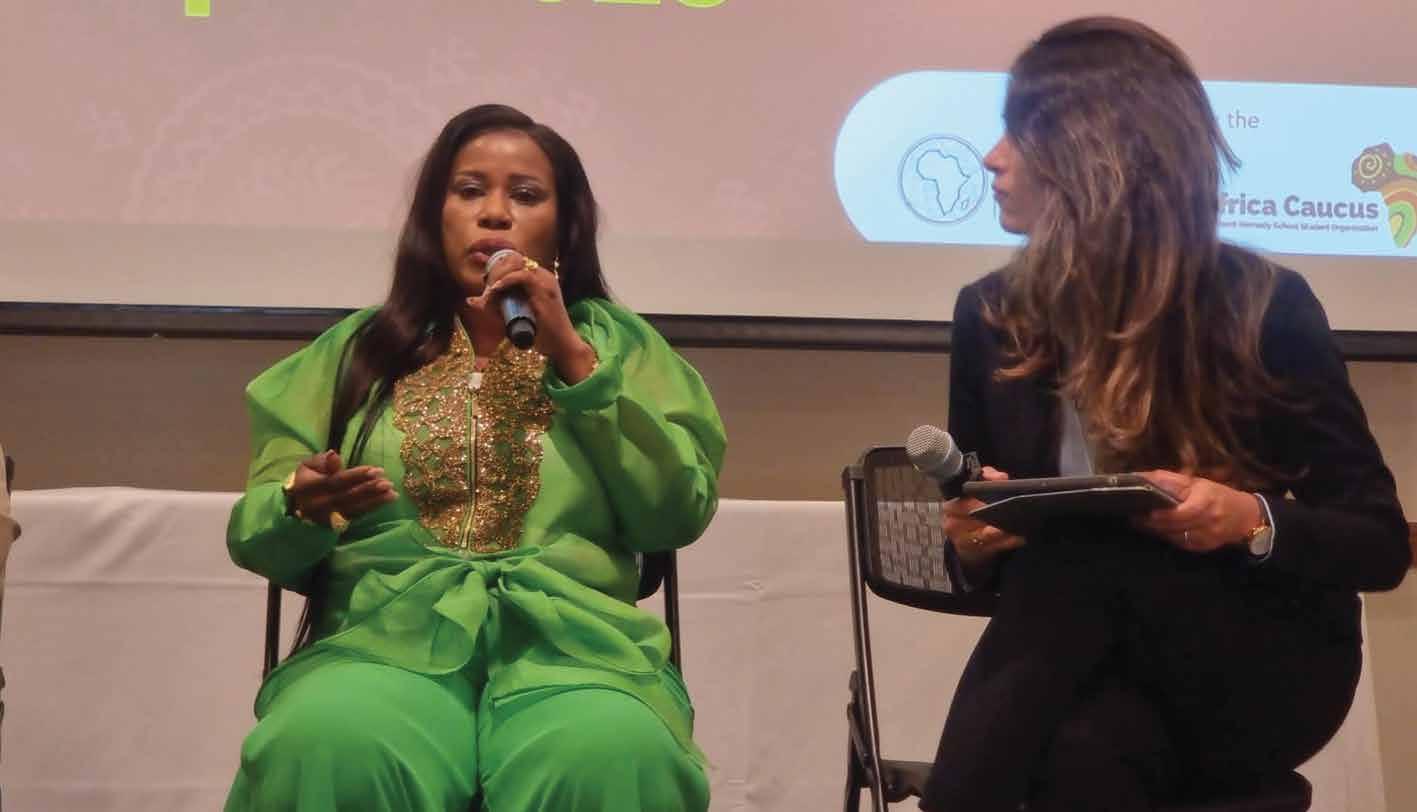
A N E W T HINKI N G THURSDAY 27 APRIL 2023 Issue No. 43
4 4 2 Pg 7
The CEO of American International School, Mrs. Adelaide A. Siaw-Agyepong, has observed that Africa needs people who are sustainable development oriented to transform the continent.
Pg 3
We need sustainable development-oriented people to transform Africa
! UN World Data Forum: Vodafone’s Angela Mensah-Poku Speaks on Data for Social Good
2
2
Volta Aluminium Company Limited (VALCO) is on the market to identify a strategic investor before the turn of the year, manageme nt of the company have disclosed at this year’s Annual General Meeting (AGM) in Accra.
By Eugene Davis
By Aurelia Baaba Ofori Head, Africa China Trade Banking, Stanbic Bank
ed (VALCO) is on the market to identify a strategic investor before the turn of the year, management of the company have disclosed at this year’s Annual General Meeting (AGM) in Accra.
According to management and the board, they are hopeful of locating a Strategic Investor before the end of 2023.
This follows the approval by the Cabinet of Ghana for VALCO and the Ghana Integrated Aluminium Development Corporation (GIADEC) – the entity holding VALCO’s shares on behalf of the Government of Ghana - to head-
 By Eugene Davis
By Eugene Davis
Valco seeks strategic investor by close of year
Chief Executive O cer, Mr. Dan Acheampong was very pleased to note that VALCO has come a long way from where it faced huge existential challenges, to a relatively stable and productive business, in readiness for the expected massive take o with the sourcing of a strategic investor.
Further, Mr. Acheampong told the meeting that notwithstanding improvements in performance in the last three years, the company was not out of the woods yet. However, team VALCO, he continued, was committed to working in line with its principle of “continuous improvement,” leaving no stone unturned and has been building upon these improved performances to bolster con dence in the company’s ability to become a world class smelter.
to revamp the aluminium smelter. The Company says it has identied some product-value maximization and a host of cost reduction initiatives to make the operation sustainable in the short-term while working to implement the nal phase of the Recovery Plan. This is in consonance with the VALCO Modernization Project dubbed Project 4 under GIADEC’s Integrated Aluminium Industry (IAI) Project Masterplan currently under execution.
ner towards the retro t (modernization) of the Smelter to bring to it to world-class standard in terms of technology, operating e ciencies and costs, pro tability, among other bene ts.
The Chairman of VALCO, Dr Henry Benyah, told participants at the company’s AGM held in Accra on Wednesday, while presenting the state of a airs of the company for 2022,indicated that Transaction Advisors have been engaged “to manage the process of the search and selection of a Strategic Partner with the requisite technical capacity to deploy the most competitive smelter technology, backed by the

needed investments and strategic global linkages in consideration for an agreed equity stake in a restructured VALCO”.
He noted that the company has experienced relatively stable operations for the past two years, as is buttressed by the results for 2021 and 2022. In comparison to its performance over the past decade, VALCO recorded its best-ever performance in 2022, second only to the results of 2021, posting an adjusted Earnings Before Interest, Taxes, Depreciation and Amortization (EBITDA) positive return of USD5.39 million.
Reporting on the operational performance of the Company, the
The company hopes to leverage its successes in the last three (3) years regarding operational stability to lay a rm foundation for 2023 and beyond. This is in line with the objectives outlined in its ve (5) year Strategic/Recovery Plan (2020-2024) which places emphasis on maintaining operational stability as it transitions to the “Retrotted VALCO” to assure a sustainable turnaround.
The Minister of Public Enterprises, Joseph Cudjoe who was present at the event commended VALCO for improved performance since 2011 and pledged government’s support
In the coming year, VALCO emphasizes that it will position itself rmly in the aluminium downstream segment of the Aluminium value chain. This it hopes to do by way of entering into joint ventures (some of which are currently in the developmental stages) or direct participation in the high-end value-addition downstream segment of the Aluminium value chain. The company believes that incorporating downstream activities into its operations like all globally competitive smelters have done, would make its operations more viable.
VALCO also recognizes the fact that the future of aluminum is “green”. It is therefore, positioning itself through various environmentally-friendly initiatives to reduce its carbon footprint in order to take its pride of place as a net carbon emitter and a “Green Aluminium” Smelter.
Exploring export opportunities in the world’s biggest market
rently is the biggest importer of cassava from Thailand to feed its industries. They produce ethanol from cassava, modi ed starch for papermaking and the textile industry. Cassava is the new gold for Ghana yet not much has been done to develop this product for the international market. Taking advantage of this opportunity will be key in enhancing Ghana’s agriculture value chain.
country in the world. Ghana with its abundant arable lands could start looking at empowering investors to enter into commercial agriculture to feed the world.
tion itself strategically to become a trade ally to China, speci cally in the exportation of Ghana’s agricultural products. Data show that China cur-
Again, China Despite China’s notoriety of being a country of producing and manufacturing and known for its trade surplus it has always been a net importer of agricultural products for almost a decade. Agricultural related products including fruits and vegetables, dairy, pork, Soyabeans, corn, wheat, rice and acholic beverages are imported into the country more than any other
One will ask why we must explore opportunities in China in the face of ongoing e orts to enhance trade between and among African countries through the opportunity provided by the Africa Continental Free Trade Agreement (AfCFTA). AfCFTA seeks to connect the 1.3 billion people across 55 African countries with GDP of over $3.4 trillion according to the World Bank 2022 AfCFTA Report.
There is a lot of work to be done by Ghana to in uence this space. To be relevant in this space will require a deliberate attempt to improve infrastructure, manufacturing value chains, digital platforms
and technical capacity of businesses to produce at a cost-e ective manner in copious quantities to meet the demands of the intra Africa trade. There is some apprehension when the word ‘import’ is mentioned in Ghana.
Yes, the country is currently import dependent and we need to change the narrative. However, no country in the world has done away with importation entirely. It is what we import that makes it concerning.
If Ghana wants to be relevant in AfCFTA we have no choice than to import machinery and raw materials to be able to rapidly feed the industries for production. This means we will still need to import, however, what we import will be di erent than the norm. China o ers us the
choice of cost- e ective machinery and raw materials for Ghana’s intended industrial growth. China is considered the ‘factory’ of the world and the second biggest exporter in the world, yet they import too. Only that they are net exporters. They export more than they import. Ghana could learn from that too. The point being made here is that as we export into other African markets, we should not forget that we can leverage the capabilities being built to take advantage of other international trade corridors such as the Ghana China one. After all, as you grow industries, you will need machinery, as you improve manufacturing you will need raw materials, as you seek to export you will need distribution/logistics channels for road, air and sea transportation. In all of this, leveraging China for Ghana to dominate AfCFTA will be a brilliant idea.
development- oriented people to transform Africa
changing world does not need people who have mere knowledge and can regurgitate principles on the internet through multiple search engines and can perform the same thing.
“We need persons who are aligned with sustainable development, responsible business conduct, and laced with humanity because knowledge that does not consider the survival of humanity and the generations to come are as treacherous as no knowledge,” she stressed.
She explained that, as such “a wholistic education is needed and is one that uses knowledge to solve
every day problems, recognizing the survival of humanity as dependent on the survival of one and all and works towards improving our individual and collective lives”.
“The world needs people who are ready to learn unlearn and relearn” she stressed. Touching on how private schools in Ghana adapted and mobilized resources to aid teaching and learning in the educational sector during the COVID-19, Mrs. Siaw-Agyepong observed that during the COVID-19 pandemic, the private schools had to quickly adapt and mobilize resources to aid teaching and learning.
She added that most private schools transitioned to online learning platforms by creating online learning platforms to provide students with access to learning materials and resources from home. “These platforms often included features like video lectures, interactive quizzes, and virtual classroom discussions,” she added.
She also noted that private schools and educational companies provided students with learning materials like textbooks, workbooks, and worksheets to enable them to continue learning at home. “Some also provided technology devices like laptops and tablets to students who did not have access to them,” she

Thursday 27 April 2023 – Investment Times 2
–
We need sustainable
Adelaide Agyepong
Mr. Dan Acheampong, extreme right -CEO of VALCO addressing participants at the company’s AGM in Accra
By Aurelia Baaba Ofori
Head, Africa China Trade Banking, Stanbic Bank
by the African Caucus of the Kennedy School of Law and Harvard African Law Association, Mrs. Siaw-Agyepong noted that the
Africa’s education challenges and opportunities post COVID-19 pandemic” at the 2023 edition of the Africa Development Conference organized
added.
During the period also, some private schools and educational companies provided training for their teachers to enable them to adapt to the new online learning environment. This training often included how to use online teaching tools, how to conduct virtual classroom discussions, newsletters and how to provide feedback and assessments online. This improved communication.
“Private schools and educational companies invested in technology to ensure that students had access to the necessary devices and internet connectivity. This often-included purchasing laptops, tablets, and other devices for students and providing internet connectivity to those who did not have it” the CEO of American International School.
Answering a question on what changes American International School undertook to ensure that
learning continued? She explained that, when it was becoming clearer that a lockdown was imminent, AIS put in place a Covid 19 taskforce which brainstormed and discussed strategies to continue teaching and learning in case that happened.
“This reinforced what we believed already. We believe students should take ownership of their learning. Hence, we constantly o er professional development to our teachers to deliver inqui-
ry-based/ researched-based models of education. The combination of this and hybrid learning means we were ready to transition to an online classroom when needed,” she stated. The Africa Development Conference is a student-led event that convenes academia, students, and practitioners to highlight and explore critical issues related to the African continent’s development. This year’s took place between the 15th - 16th of
April, 2023, at the Harvard Law School, Cambridge, Massachusetts. The theme for this edition is “Reimagining Africa’s Growth on Our Terms.”
The Conference had panels, reside chats, and keynote speeches on topics including how Africa can thrive in international trade, challenges and opportunities in transitioning to a green economy, the role of creative arts in development, the Africa we want, and other engaging topics.
Standard Bank Group champions sustainable investing & climate transition across Africa
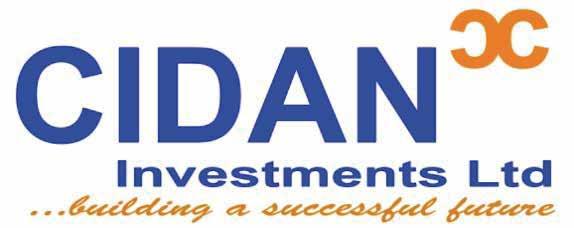

The Bank’s commitment to ESG nds expression in its climate policy which, among many other things, articulates the approach to gas as a transition fuel in Africa. Standard Bank believes that a crucial component of balancing economic development and social uplift with a reduction in greenhouse gas emissions lies in developing Africa's natural gas resourc-
To reduce greenhouse gas emissions, energy sources with higher emissions, such as wood and coal, will need to be replaced with lower-carbon fuels, such as lique ed petroleum gas for cooking and natural gas for baseload generation.
In Ghana, for example, Standard Bank South Africa and Stanbic Ghana acted as the debt arranger and coordinating bank for a syndicated loan for Genser Energy Ghana Limited to support the construction of a natural gas pipeline and processing facilities. The impact of the project will be far
The funding will be used to renance Genser’s existing debt and support the next phase of its ex-
pansion, enabling construction of a 105km natural gas pipeline to Ghana's second largest city. Kumasi, a gas conditioning plant in Prestea, and a natural gas liquid (NGL) storage terminal at Takoradi Port.
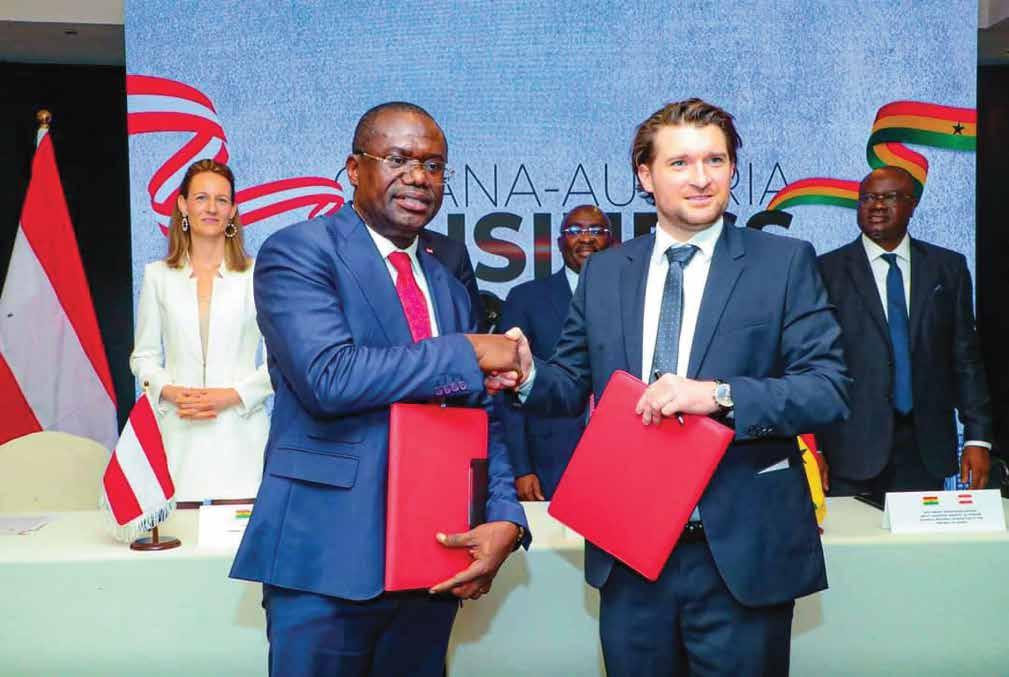
The transaction will not only support Genser’s energy transition strategy but also contribute to Ghana’s national climate change targets. Furthermore, the availability of cheaper and readily accessible piped natural gas will assist Genser’s customers to transition from imported trucked diesel and heavy fuel oil (HFO) to local natural gas alternatives, thereby reducing emissions. This comparatively cheaper and cleaner energy source will also support Ghana’s bid to relocate power plants from coastal regions to reduce line losses and improve the national grid's energy e ciency. It further has the potential to position the country as a signi cant producer and exporter of NGLs.
The Head, Energy and Infrastructure, Stanbic Bank Ghana, Sydney Nii Ayitey Tetteh, put the impact of nancing the Genser project in perspective. In his words, “We are committed to partnering with businesses and other relevant stakeholders to nd the right energy solutions to improve and drive Africa's growth.
This transaction enables Genser to take gas from the upstream that would otherwise be ared and direct it back into the Ghanaian economy. The processed gas and associated hydrocarbons will be used as fuel to provide power to homes to displace kerosene and other more carbon emitting fuels as energy sources and provide natural gas and liquids for the industrial sector. This is imperative for Ghana's energy transition and climate change goals.”
Standard Bank and its subsidiaries across the African continent have indicated, strongly through the nancing of this project and many others, their commitment to nance gas responsibly over the medium to long term as a transition fuel for use in domestic and regional markets as well as a means of facilitating natural gas for export.
The Bank is committed to developing a transition nance product framework that will support the use of gas in its speci c role as a transition fuel in Africa. The culmination of this ESG agenda is reducing emissions intensity while managing gas exposure on the African continent.
Boosting International Trade:How SWIFT payments empower SMEs for AfCFTA
What is SWIFT?
SWIFT stands for Society for Worldwide Interbank Financial Telecommunication and is a network that connects banks and other nancial institutions across the world. The network provides a secure and reliable platform for the transfer of funds between banks, making it a popular choice for international payments for goods and services.
SWIFT payments, therefore, refers to an international messaging system used by banks and other nancial institutions to securely exchange sensitive payment instructions related to international trade and money transfers.
The SWIFT system uses a standard system of codes to transfer money from one country to another. Each bank or nancial institution enrolled on the SWIFT platform is given a unique eight (8) to eleven (11) character long, standard format which identi es banks and nancial institutions worldwide. Eg (ECOCGHACXXX). Some of the message codes that banks, and nancial institutions use to communicate amongst themselves are, MT103 – this is a standard SWIFT payment message, used to instruct the transfer of funds from one individual account to another. MT202 – This
SWIFT message is used for bank-to-bank transfers, specically for covering banks. MT700 – This is a SWIFT message used for issuing letters of credit. MT199 – This is a SWIFT message used for sending a free format message. MT910 – This is a SWIFT code used for con rmation of credit. MT940 – This is a SWIFT message used for balance reporting.
Bene ts of SWIFT Payments to SMEs

(i) Speed.
Payments made through the SWIFT network typically take only a few hours to complete, depending on the banks involved and the time zones. This is signi cantly faster than traditional methods of making payments across borders, which could take several days or even weeks to complete. The speed SWIFT payments come with is a sure way to enable our local SMEs receive and send money quickly for goods and services and increase trade volumes, free up time previously lost while waiting to conrm payments. This can be crucial for Small and Medium-Sized Enterprises (SMEs) that operate in fast-paced environments where quick access to capital can be the di erence between success and failure. For instance, a shoe manufacturing house in Accra were to buy raw materials
from a leather manufacturer in Kenya, it would be able to make payment for the leather instantly on the SWIFT platform. The leather manufacturer in Kenya would receive payment into its bank account, thereby skirting currently common delays – freeing up time to respond quickly to the order from Accra.
(ii) Security.
The SWIFT network is highly secure and uses state-of-the-art encryption to protect the transfer of funds. This ensures that the transfer of funds is safe from any potentially fraudulent activity or unauthorized access. This can help to build trust between SMEs and their customers, partners, and suppliers, which can be especially important for businesses that operate in regions where fraud and cybercrime are prevalent.
(iii) Convenient and easy to use.
Local Small and Medium-sized Enterprises can initiate payments through their bank or nancial institution, and the transfer is processed quickly and e ciently. Additionally, many banks and nancial institutions o er online platforms and mobile applications that allow customers to initiate SWIFT payments from the comfort of their own homes. This can be particularly convenient for our Ghanaian SMEs that need to make urgent payments or transfers outside of regular business hours.
(iv) Access to global mar-
kets. SWIFT connects four billion accounts across more than 11,000 institutions in 200 countries and territories to securely and condently move value around the world. SWIFT payments can help our local Ghanaian SMEs to expand their reach beyond their local markets and tap into new global markets. This can be particularly valuable for businesses that operate in industries such as manufacturing, where entree to global supply chains and international markets is critical. SWIFT operations in Ghana, particularly when it comes to the African Continental Free Trade Area (AfCFTA) will be very bene cial to the promotion of trade amongst SMEs in the region. The SWIFT platform would enable cross-border payments and support the African Union’s undertaking of creating a single market and trading coalition by making payment systems interconnected across the continent, thus easing the free exchange of goods and services.
Again, SMEs in Ghana are better o using SWIFT as a medium to make their advanced payments, documentary collections and issuance of letters of credit in their international trade activities. The funds allowed to be transferred on the platform to e ect payments to partners and suppliers is unlimited. Unlike the other money transfer platforms (Western Union, Unity Link, etc) which
restricts the amount that can be transferred at a go.
(v) cost-e ective SWIFT payments can be cost-effective for SMEs in Ghana that need to make regular payments or receive payments from overseas. This is because they o er competitive exchange rates and fees, which can help SMEs to save money on currency conversion and transfer fees.
(vi) Transparency and visibility SWIFT payments provide a high level of into the payment process in international trade. The platform provides payment pre-validation service which allows banks and nancial institutions to authenticate bene ciary account details before an international payment is sent, thereby eliminating a key point of abrasion in cross-border trade transactions. Before sending a payment, banks and nancial institutions connected onto the SWIFT network can check the validity of the bene ciary account by comparing it against SWIFT’s enormous store of transaction data. The validations are completed in real-time through APIs, and pre-validating payments will save time and reduce friction between businesses and their partners.
(vii) Highly automated
This help streamline trade transactions and reduce administrative burdens. This can be especially important for small and medium-sized enterprises (SMEs), which may not have the resources
Thursday 27 April 2023 – Investment Times 3 !
to manage complex payment processes.
Potential drawbacks
While there are many advantages to SWIFT payments, there are also some potential drawbacks to consider.
(i) compliance requirements
This is one of the main drawbacks that pose a big challenge to the service. SWIFT payments are subject to strict regulatory and compliance requirements, which can be challenging for SMEs to navigate. This can result in delays and additional costs associated with compliance-related activities.
(ii) delays or errors in transactions
SWIFT payments may be subject to delays and errors which can impact the speed and e ciency of the transfer. It is important for customers to carefully review the terms and conditions of the transfer and to ensure that all information provided is accurate to avoid any potential issues.
(iii) complexity
This can be a potential drawback.
The process of setting up and initiating a SWIFT payment can be complex and time-consuming for SMEs that are not familiar with
the process. This can be especially challenging for businesses that lack the technical expertise to navigate the system and ensure that transfers are executed correctly.
(iv) limited coverage. While swift transfers can provide access to global markets, the service is not available in all countries and regions like (Cape Verde, Libya,Angola, Burundi, Guinea, Morocco, Sudan, Russia, Iran, etc). SMEs operating in areas with limited SWIFT coverage may nd it challenging to send and receive payments through the service and this hampers the process of doing business smoothly amongst SMEs and their partners, and the supply chain process.
Conclusion Swift transfers have become a popular option for individuals and businesses looking for a fast, secure, and reliable way to transfer money within and across borders. While there are some potential drawbacks to consider, the bene ts of using SWIFT payments generally outweigh the costs, making them a preferred choice for many customers for payments of goods and services. Overall,
SWIFT payments can help SMEs in Africa to overcome some of the nancial barriers they face and enable them to compete e ectively in global markets. With continued advancements in technology and increasing global connectivity, SWIFT payments are likely to remain a critical component of international payments for years to come. The revolution in cross-border payments is accelerating, and the need for instant and frictionless transactions from one account to another anywhere in the world is greater than ever. SWIFT and its community partners cooperatively deliver this together, powering a more inclusive global economy that works better for everyone and making nancial services more accessible through digital channels.
The writer is a banker at Ecobank Ghana PLC focused on working with SMEs and Corporates in Ghana on their Payments service’s needs.


(iv) limited coverage.
While swift transfers can provide access to global markets, the service is not available in all countries and regions like (Cape Verde,
Libya,Angola, Burundi, Guinea, Morocco, Sudan, Russia, Iran, etc). SMEs operating in areas with limited SWIFT coverage may nd it challenging to send and receive payments through the service and this hampers the process of doing business smoothly amongst SMEs and their partners, and the supply chain process.
Conclusion Swift transfers have become a popular option for individuals and businesses looking for a fast, secure, and reliable way to transfer money within and across borders. While there are some potential drawbacks to consider, the bene ts of using SWIFT payments generally outweigh the costs, making them a preferred choice for many customers for payments of goods and services. Overall, SWIFT payments can help SMEs in Africa to overcome some of the nancial barriers they face and enable them to compete e ectively in global markets. With continued advancements in technology and increasing global connectivity, SWIFT payments are likely to remain a critical component of international payments for years to
come. The revolution in cross-border payments is accelerating, and the need for instant and frictionless transactions from one account to another anywhere in the world is greater than ever. SWIFT and its community partners cooperatively deliver this together, powering a more inclusive global economy that works better for everyone and making nancial services more accessible through digital channels.
The writer is a banker at Ecobank Ghana PLC focused on working
By Bright
Jospong Group, Komptec in 30m Euro partnership to boost rice production in Ghana
The Vice President Dr. Mahamudu Bawumia has employed investors from Austria to take advantage of Ghana's economic and political stability to invest in the country.

Speaking at B2B session with the Austrian delegation led by the Federal Chancellor, Karl Nehammer, in Accra under the auspices of the Foreign A airs Ministry, the Vice President reiterated Ghana commitment to strategic partnership with the private sector and enhanced e orts for industrialisation and productive transformation to achieve sustainable economic growth.
He said Ghana is open for busi-
ness and is eager to forge mutual bene cial rewarding relationships with Austria.
"As Ghana and Austria seem to forge stronger bonds, we have to sustain such relationship through improved technical and science-based education, technology and also address unfair trade relations among others", he stressed.
He noted that the Austrian Federal Chancellor's participation at this business forum also demonstrates the commitment of the Austrian government to enhance collaboration between private and public sectors of the two countries for mutual bene ts.
He noted that Ghana has a stable political environment, strong democratic culture, safe and happy people underpinned by freedom of expression.
"In the volatile West Africa, Ghana is ranked as the most peaceful country and the second most peaceful country in Africa, he emphasised.
He also noted Ghana has educated and competitive and trainable labour force which should motivate the Austrian investors to consider investing in Ghana.
He observed the timing for the meeting was auspicious as the devastated e ects of COVID 19, climate change and ongoing
energy and food crisis has dessmonstrated the need for increased global collaboration.
"This global development has ampli ed protection and distortions of supply chains with rami cations for economies in the continent including Ghana," he stated.

Dr. Bawumia however noted that Ghana has initiated steps to bounce back stronger.
"Ghana had its fair share of these burdens and is making concrete efforts to bounce back stronger, " he stressed.
As we pull together to revive the global economy, and secure our future against economic, environ-
mental, health security treats the contribution of Africa to these efforts cannot be understated.
Dr. Bawumia was pleased to see the union of Jospong Group and Komptec as the two signed a 30 million Euro agreement to support rice production in Ghana.
With the agreement, Komptec will support the Jospong Group rice project with machineryand technology.
"We see prospects of reassuring and making the case for some your companies to operate from Ghana and export' noted Dr. Bawumia as he witnessed the signing ceremony.
Thursday 27 April 2023 – Investment Times 4
! !
Kwaku Azumah (BA, MBA)
and ensuring that existing exibilities in the Agreement on Agriculture, especially those pertaining to Article 6.2, are fully preserved to help confront the challenges of food insecurity and, reinvigorating the WTO's negotiating function.
The above raft of measures are the proposals the Minister is making as the Organisation prepares to hold its Thirteenth Ministerial Conference (MC13) in Abu Dhabi in February, 2024.
Mr K.T Hammond made the proposals when he met with the Director-General of the WTO, H.E. Dr. Ngozi Okonja-Iweala, on the occasion of her working visit to Ghana as part of her maiden African tour which includes countries like Cote d’ Ivoire, Senegal, Kenya, Tanzania and
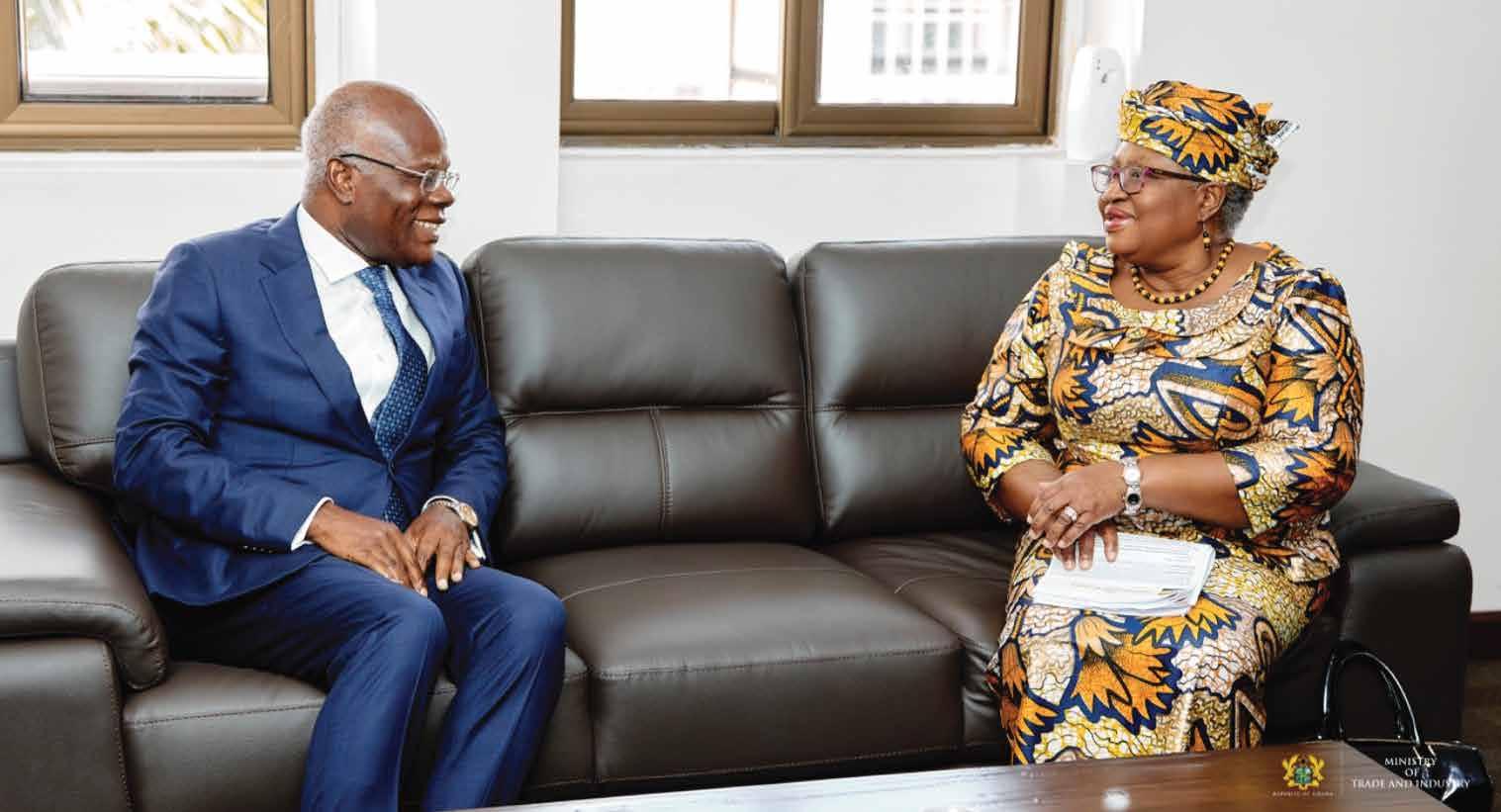
Angela Mensah-Poku, Commercial & Digital Operations Director at Vodafone Ghana, has highlighted the role of data in driving social good at the United Nations World Data Forum. She shared her experiences on a successful public-private partnership, Data for Good, which aimed at using aggregated anonymised data to improve the lives of Ghanaians.
Angela emphasised the importance of collaboration between private organisations and government institutions in generating insights that contribute to community development and socio-economic policy. “When we partnered with Ghana Statistical Service alongside Flowminder, we were able to use this partnership to really drive insight-led decisions,” she said.
The partnership has led to a wide range of use cases, such as disaster planning, tracking the spread of communicable diseases, and providing critical information during the COVID-19 pandemic.
Angela also mentioned that the
data was used to predict the movement of people during the 2021 census in Ghana, showcasing the potential impact of aggregated anonymised data on policy and resource allocation.
Speaking on the importance of building a data-driven ecosystem, Angela said, “By having the Hewlett team on board, having Flowminder on board, we were able to create a small ecosystem. And then, with our successes with the data, we’ve been able to attract a wider set of partners, whether it’s from NGOs or private businesses, and I think that this encourages the ecosystem to grow larger and inspire more impactful global insights.”
One of the key aspects of the partnership has been capacity building and knowledge transfer. Angela emphasised the need for local organisations to have the skills and ability to access and analyse data, sharing that Vodafone Ghana’s collaboration with the Ghana Statistical Service focused on the development of local skills in data science and related elds.
Angela was joined by other panellists in the discussion: Cathy Riley, Senior
Rwanda.
Thanking the Director General for choosing Ghana as her rst point of call on her African tour, the Minister noted that the decision reinforces Ghana’s credentials as the centre of African Commercial Diplomacy, in view of Ghana’s hosting of the Secretariat of AfCFTA.
He congratulated her for being the rst African, and the rst woman, to assume the position.
He applauded Dr. Ngozi for the positive signal that her occupation of the role of Director General of the WTO conveys to the many young women and girls of Africa. Recalling the support that Ghana, then as Chair of the Authority of ECOWAS Heads of State
and Government, o ered for her to assume her current role, he encouraged her to continue being a role model for Africa and was hopeful that her tenure will be successful in view of her quest to reform the WTO.
On the African Continental Free Trade Area (AfCFTA), he called for support from the WTO for its implementation through the WTO’s “Aid-for-Trade” initiative and the e ective imple-mentation of the WTO’s Trade Facilitation Agreement (TFA). He speci cally called for addi-tional ows of Aid for Trade from bilateral, regional and multilateral donors to support requests for trade-related capacity building from bene ciary countries,
Partnerships Director at Flowminder Foundation; Omar Seidu, Head of Demographic Statistics & SDGs Coordinator at Ghana Statistical Service (GSS); Chris Maloney, Director General at William and Flora Hewlett Foundation; and Winnie Kamau, Data Journalist at Association of Freelance Journalists/Talk Africa. Angela concluded by reiterating Vodafone Ghana’s purpose, “using technology to bene t humanity.”
MWC Barcelona 2023
The company’s commitment to the project stems from the belief that insights derived from data can drive social good, improve critical sectors such as healthcare and education, and foster the growth of small and medium enterprises.


The UN World Data Forum, a hybrid event held both in-person and online this year, is taking place in Hangzhou, China. The forum brings together leaders and experts from various sectors to discuss the power of data in shaping the future and creating a more inclusive and sustainable world.
UN World Data Forum: Vodafone’s Angela Mensah-Poku Speaks on Data for Social Good Trade Min calls for reform at WTO to benefit developing countries

He also encouraged the mainstreaming of trade into national development strategies by partner countries; and support for improved ways of monitoring and evaluating the initiative with a view to seeking enhanced implementation.
On her part, the Director General, H.E. Dr. Ngozi Okonja-Iweala, maintained that the reforming the WTO’s adjudicating system remains her priority, and explained that there are two tiers to the dispute settlement system
“One of the things we need to reform is it dispute settlement systems, it has the panel level –where you bring your case and is judged and the second one of the appellate body where when you
feel aggrieved you bring it and they handle it, but the appellate body is not functioning be-cause we do not have enough judges, but we are working at reforming it. It is on the agenda for the 13TH Ministerial conference and Ghana can really help by putting its weight into insisting that work should continue at WTO so we reform this system by the time we get to the Ministe-rial,” she said.
The World Trade Organisation (WTO) was established in January 1995 as an Intergovernmen-tal Organisation to regulate international trade with its headquarters in Geneva, Switzerland. It has a membership of 164 countries.
Thursday 27 April 2023 – Investment Times 5
Huawei and partners hold TECH4ALL media roundtable on Day 1 of
WTO boss wants Ghana to ratify fisheries subsidies agreement
By Eugene Davis
to formally accept and ratify the organisation’s Agreement on Fisheries Subsidies which was adopted by consensus at the WTO's 12th Ministerial Conference (MC12) in June last year.
The agreement, she said sets new binding and multilateral rules to curb harmful subsidies, which are a key factor in the widespread depletion of the world's sh stocks.
rectify the agreement to help manage its sh resources.
Ms Okonjo-Iweala made the appeal on Tuesday when she called on the Ministry of Trade and Industry as part of her rst ofcial visit to Ghana, since taking o ce on March 2021. Her African tour initially was expected to take her to ve other countries aside Ghana, after next stops to Cote D’Ivoire and Kenya, she will y back to Geneva, Switzerland
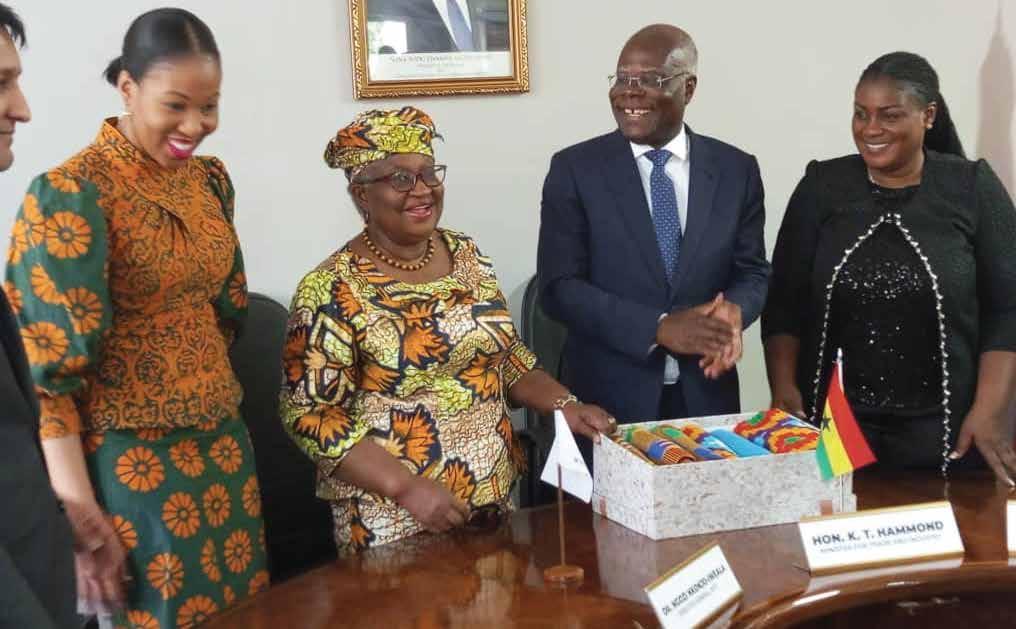
Ghana to expedite the rati cation by June this year even though the deadline given to member countries is February next year where the 13th WTO Ministerial Conference (MC13) will take place in the week of 26 February 2024 in Abu Dhabi, United Arab Emirates (UAE).
“One of the things I am going to ask your excellency and Mr. President is that Ghana should ratify the agreement as soon as possi-
ble, if you ratify it there is also a fund called the Fisheries fund -we are raising US$20m and already US$7m has been pledged to help developing countries strengthen their management capacity to manage their sheries. Many of our countries need strengthening.”
The Agreement prohibits support for illegal, unreported and unregulated (IUU) shing, bans support for shing over shed stocks, and ends subsidies for shing on the unregulated high seas.
“I want African countries to ratify this agreement faster, so Ghana can set an example and I hope Minister can help so by June, Ghana rati es” she added.
The Minister of Trade and Industry, Kobina Tahir Hammond, on his part indicated that government is conscious of the agreement and is making e orts to get it rati ed in good time to enable the country access portion of the WTO's US20m dollars sheries fund to assist developing countries.
“We will do our best, Ghana takes seriously its responsibilities with these organisations and if there is this matter to recognize and ensure that e ective rati cation to ensure a
smooth process, we assure you will we will do our best, but as it is in our country we will have to rst ratify and go into our incorporation of ratied document into our law for it to become e ectively operational. The minister of sheries will be noti ed about it, we will go the president and discuss it with him, I am sure it will be rati ed in good time for the next meeting.” the minister said.
Mr. Samuel Quaatey, technical advisor at the Ministry of Fisheries and Aquaculture said the country js at the "planning stage and undertaking stakeholder engagement " before it will be drafted and sent to Cabinet before onward transfer to parliament for approval.
However before all these ne details are e ected, he disclosed that amendment needs to be made to the country's Fisheries Act to be in tandem with WTO's Fisheries Subsidies.
The Fisheries Subsidies when ratied will help prevent over-exploitation and illegal vessels charting on the country's oceans.
There are 44 African countries who are members of the World Trade Organisation, with its purpose being the guardian of rules on how private sector trade with each other.
GEXIM organises stakeholder consultative forum on handicraft
The Ghana Export - Import Bank (GEXIM) on Tuesday 25th April 2023 organised a Stakeholder consultative forum on handicraft at its head o ce, located at the Africa Trade House in Accra. It was under the theme: “Facilitating International Trade, The Role of Ghana Export –Import Bank in the Handicraft Export Sector”.
The Stakeholder Consultative Forum was a platform created by the Bank for all key and relevant stakeholders in the handicraft export sector to discuss solutions to challenges within the sector. In addition, it was an opportunity to introduce products of the Bank’s Export Trade Department to the industry players.
In her welcome address, the Deputy Chief Executive O cer of GEXIM responsible for banking, Ms. Rosemary Beryl Archer, underlined the Bank’s commitment in supporting the Government of Ghana’s agenda to industrialise the country. “As a leading de-
velopment bank, GEXIM remains dedicated to supporting the Government’s agenda to transform the Ghanaian economy into an export-led one by supporting and developing trade between Ghana and other countries.
Through several interventions by the Bank and support to identi ed priority sectors of the economy, the Bank is working on the elimination of critical market failures to make Ghana more competitive in the global marketplace”, she emphasised.
The Chief Executive O cer of GEXIM, Mr. Lawrence Agyinsam, highlighted the importance of the handicraft subsector to the Ghanaian economy and cultural heritage. He said, “the handicraft subsector generates foreign exchange earnings for Ghana through exports, contributes to employment creation, poverty reduction, and
the promotion of Ghana's rich cultural heritage.
The data available in Ghana shows that the total value of handicraft products exported in 2021 was USD$ 45.2 million, representing 1.35 percent of the total non-traditional export value for the year.
The National Export Development Strategy expects that by the end of 2029, Ghana’s non-traditional export will increase to USD$25.3 billion. We believe that investing in the handicraft subsector will help Ghana achieve the non-traditional export target in 2029”.
On his part, the Deputy Minister of Trade and Industry, Hon. Michael Okyere Baa , indicated that the handicrafts have always been an important part of Ghana's cultural heritage, not only as a source of artistic expression but also as a means of livelihood for many Ghanaians.
He added that “the Ministry of Trade and Industry has played a pivotal role in creating an enabling environment for the export of handicrafts. It has implemented policies and programs that have facilitated trade and improved the competitiveness of Ghanaian handicrafts in the global market.
Through the export promotion initiatives, the ministry has provided support to Ghanaian exporters, including those in the handicraft sector, to access international markets and participate in trade fairs and exhibitions.
The Acting Chairperson of Handicraft Association of Ghana, Ms. Fulera Seidu, called for more support and collaboration from state agencies and regulators to enable their members to scale up in their operations and increase their productivity, thereby leading to more export earnings.
She further urged members of the Handicraft Association of Ghana to strategically position themselves to take advantage of GEXIM’s nancial package to increase their operations and exports.
Over the years, the GEXIM has collaborated with the Ministry of Trade and Industry to promote Ghanaian handicrafts in International Trade Fairs and Exhibitions. In addition, the Bank provides funding for their operations, training and capacity-building programs for artisans and businesses in the handicraft sector.
Dr. Fareed Kwesi Arthur, Coordinator, National AfCFTA Coordination O ce, representatives of the Ghana Investment Promotions Centre (GIPC), Ghana Export Promotion Authority (GEPA), Ghana Free Zones Authority, Forestry Commission, and members of the Handicraft Association of Ghana attended the forum.
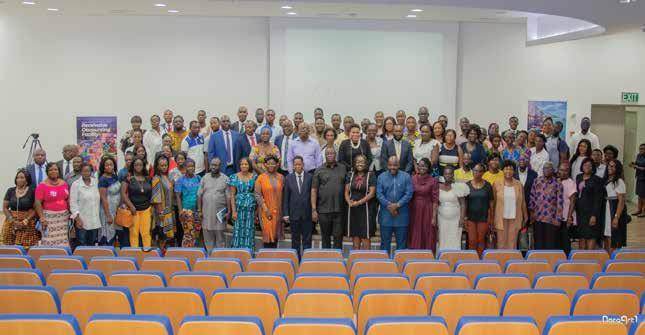
Thursday 27 April 2023 – Investment Times 6
Vodafone in collaboration with Top Employers Institute celebrates inaugural “For A Better World of Work Day”
Vodafone Ghana is taking the lead in creating a better world of work with its rst annual "For a Better World of Work Day" under the theme "Celebrating Similarities." The day, which will be held on April 26th, is dedicated to all aspects of work and aims to promote a positive work environment, employee satisfaction, and productivity. Commenting, Vodafone Ghana’s HR Director Hannah Ashiokai Akrong said, “It is an initiative aimed at creating a more supportive work environment and promoting inclusivity and diversity in the workplace.”
“By celebrating similarities and recognising the shared values and goals of employees, Vodafone
Ghana hopes to create a workplace culture that values and supports its employees,” she added.

The theme for this year's event, “Celebrating Similarities,”is particularly relevant in today's world, where divisions and di erences seem to be more prominent than ever. It emphasises the importance of recognising and appreciating our shared experiences, goals, and values.
“By focusing on what brings us together rather than what sets us apart, we hope to foster a sense of community and belonging among employees,” Ashiokai said. The event is designed to promote employee engagement, happiness, and productivity and to create a workplace culture that values diver-
sity and inclusivity. One of the key bene ts of “World of Work Day” is the opportunity it provides for employees to connect with each other and with the organisation. The event also o ers a platform for employees to voice their opinions, concerns, and ideas for how to improve the workplace.
Vodafone Ghana has demonstrated its commitment to creating a positive work environment through its partnership with the Top Employer Institute to celebrate “World of Work Day”. By celebrating similarities and promoting inclusivity and diversity in the workplace, Vodafone Ghana is reiterating its leadership as one of the top employers in the country and across Africa.
Over 20 industry players awarded at Ghana Beverage Awards
The 7th edition of the just-ended Ghana Beverage Awards held at the plush Kempinski saw over 20 industry players being honoured for their ingenuity and hardwork for the year under the review.
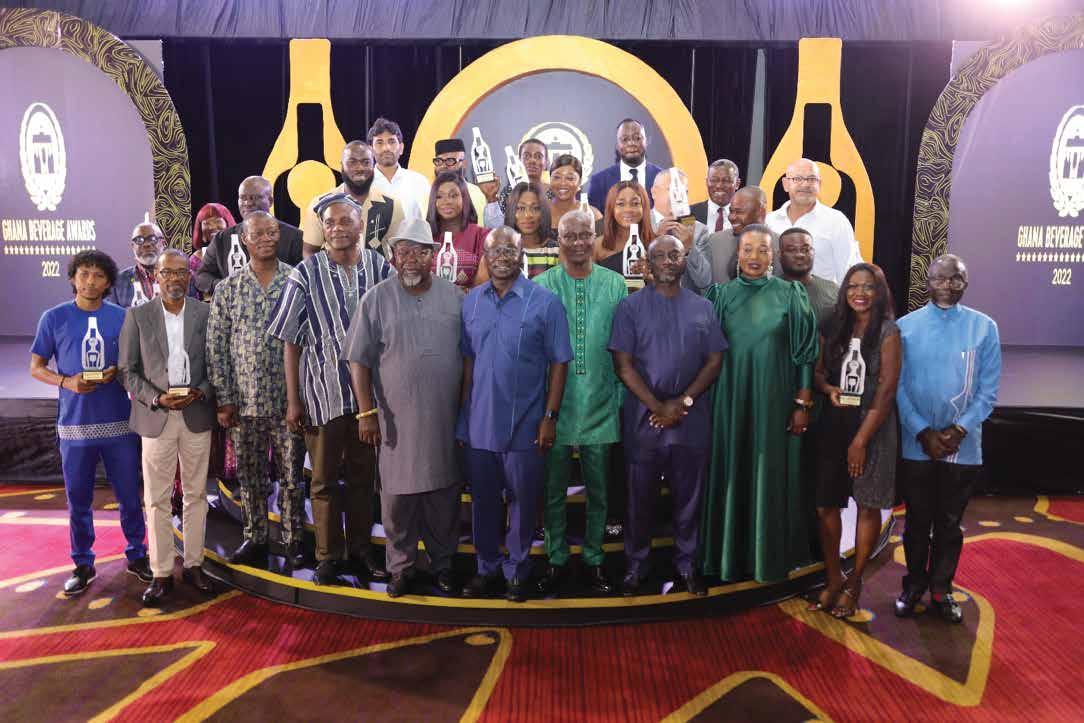
Beverage companies that were recognized included Acadia Industries Limited, Kasapreko Company Limited, AA Food and Beverages, among others.
Tampico carried the night as the ultimate winner, emerging victorious in the ercely competitive Product of the Year category.
Mensdo Bissap and Vitamilk’s Fills
Good, Anywhere Anytime Campaign emerged winners for the nouvelle Indigenous Beverage Brand of the Year and Beverage
Campaign of the Year categories.
Speaking at the event, Chief Executive O cer for Global Media Alliance, Ernest Boateng, commended the beverage industry for their contribution to national development while re-iterating the scheme’s commitment to supporting the industry.
“The beverage industry is a key driver in the development and sustenance of the nation’s economy. It is a huge revenue-generating industry, which supports the country in employment creation, service delivery and more. Cognisant of this fact, it is always our delight to provide an avenue as this which gives room for interaction and networking among stakeholders of Ghana’s Beverage industry while at the same time
providing the opportunity for industry players to share ideas relevant for the growth of their industry,” he said. He congratulated the winners of the various categories describing each win as “well deserved “and one that brings the scheme closer to its vision of helping grow our local beverage brands and subsequently widening their footprint on the international market. Taking his turn, Executive Director of the Chartered Institute of Marketing, Mr. Kwabena Agyekum noted that the interventions of marketing practitioners have over the years contributed signi cantly to the growth and expansion of the beverage industry while calling for concerted e orts from corporate organisations for a sus-
tained drive of innovation and creativity among beverage industry players.
“Recognizing the critical role of the beverage industry in the nation’s development, marketing practitioners have always led advocacies for the industry and worked with government and relevant stakeholders to create an enabling environment for the industry to thrive. These interventions have helped to expand and boost the capacity of players in the industry, leading to the sector’s expansion as well as healthy competition among industry players.
Support from corporate organisations including this prestigious awards scheme has contributed signi cantly to driving innovation and creativity among players in the industry thereby contributing to the
successes of the beverage industry. However, it is crucial for more corporate organisations to throw their weight behind the industry for sustained e orts and greater achievements.”
GBA is organized under the theme “Inspiring Excellence in Ghana’s Beverage Industry”. In a lead up, nominations were opened to allow the public and beverage companies to nominate their favourite beverage brands. Closure of the nominations ushered organizers into the voting phase which allowed the public to vote for their favourite brand in the Product of the Year Category. This year’s edition of the GBA witnessed erce competition at the voting stages with a 20% increase in voter turnout compared to the previous edition.
Thursday 27 April 2023 – Investment Times 7
Farmers across the country have had to deal with a very harsh dilemma especially with the hike in prices of farming inputs.
One of such produces creating this limbo is fertiliser. This year alone, some say the prices of inorganic fertiliser has more nearly tripled leaving them with very few options.
A major cause, the ongoing war in Europe between Russia and agricultural value chains.
Consequently, prices of compost are at an all-time high. Experts earlier pointed to Covid-19 impacts and its accompanying volatility as the cause.
However, the onset the war between the two counties further disrupted the value chain as Russia took drastic measures in response to international sanctions slapped at them.
Russia urged its fertilizer manufacturers temporarily stop exports of their products amid shipping concerns and later announced more export restrictions to secureers. This means, global prices surged to record levels.
Geographically, this concern looked like nothing for Ghanaians to be worried about.
But this development, in addition
Stanbic Bank partners Genser Energy to provide clean energy solutions
Stanbic Bank and its parent bank, Standard Bank South Africa have acted as debt arranger and coordinating banks for a syndicated loan for Genser Energy Ghana Limited to support the construction of a natural gas pipeline and process-
The transaction is in line with the Bank’s climate policy which supports e orts to mitigate the impact of climate change, and to improve access to reliable and sustainable energy sources: a critical factor in economic growth and poverty alleviation in Africa.
Speaking on the impact of the transaction, Head, Energy and Infrastructure, Stanbic Bank Ghana, Sydney Nii Ayitey Tetteh said the bank is committed to partnerships that aim at nding the right energy solutions on the continent.
He said “We are committed to partnering with businesses and other relevant stakeholders to nd the right energy solutions to improve and drive Africa's
growth. This transaction enables Genser to take gas from the upstream that would otherwise be ared and direct it back into the Ghanaian economy.
The processed gas and associated hydrocarbons will be used as fuel to provide power to homes to displace kerosene and other more carbon emitting fuels as energy sources and provide natural gas and liquids for the industrial sector. This is imperative for Ghana's energy transition and climate change goals.”
He added that “Our commitment to gas nancing is informed by the emissions and development plans of our key markets. We will continue to nance gas responsibly over the medium to long term as a transition fuel for use in domestic and regional markets as well as a means of facilitating natural gas for export. We commit to developing a transition nance product framework that will support the use of gas in its speci c role as a transition fuel in Africa. We continue to work toward reducing our emissions intensity while man-
aging our gas exposure.”
The funding will be used to renance Genser’s existing debt and support the next phase of its expansion, enabling construction of a 105km natural gas pipeline to Ghana's second largest city. Kumasi, a gas conditioning plant in Prestea, and a natural gas liquid (NGL) storage terminal at Takoradi Port.
The transaction will not only support Genser’s energy transition strategy but also contribute to Ghana’s national climate change targets. Furthermore, the availability of cheaper and readily accessible piped natural gas will assist Genser’s customers to transition from imported trucked diesel and heavy fuel oil (HFO) to local natural gas alternatives. This comparatively cheaper and cleaner energy source will also support Ghana’s bid to relocate power plants from coastal regions to reduce line losses and improve the national grid's energy e ciency. It further has the potential to position the country as a signi cant producer and exporter of NGLs.
-
bility in oil and gas prices are driving up cost leaving a ripple
The World Bank has already indicated that global fertiliser prices had risen 30% by early 2022 on the heels of an 80% hike in 2021.
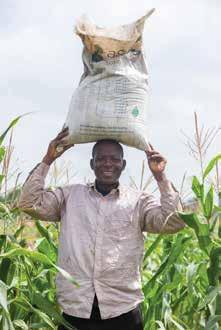
Crop farmers are feeling the pinch as shortages now threaten their livelihood.
Joseph Wilson Kwashie is a farmer in Ashaiman. He is also secretary to a body of about 107 irrigation farmers in his locality. This means, aside from his, Joseph sees the challenges of each farmer as they come to his desk for attention.
He explained that the past year has been a trying one for his fraternity. directly because normally you go to buy and you won’t get some. Meanwhile, the price too has tripled. Last year, we bought a bag at around Ghs100 or Ghs120 whereas at the moment, a bag is going for GHS350. Some are going for Ghs450,” he said.
But there is a silver lining in the organic alternative. The development is nudging more farmers towards organic fertlisers.
Joseph says they are cheaper, last longer in the soil and produces more yields without health complications.
“When we apply the organic fertiliser it will stay longer. It will help us get more yield which is very good to shift to organic fertiliser.
Inorganic fertiliser depends on the use of natural gas and the mining of nutrients such as phosphorus that will be exhausted by the end of this century at the current pace of extraction. This only predicts a gloomy outlook for the inorganic nutrients for which reason local farmers need to plan for the long-term.
Asase Gyefo Organic Fertiliser sits at the forefront of providing solution to this problem.
Kelly Ampofo is greenhouse farmer in Accra. He says using a the Asase Gyefo has helped him “save expenses and cost”
“Looking at the yield that we are getting now, comparing that to before, the Asase Gyefo has helped us a lot. You can see the leaves, the taste is very good.”
According to Kelly, he put the organic fertiliser to the test by using just 8 bags to ascertain the results compared to its inorganic counterparts.
“So we tried Asase Gyefo here which was only 8 bags. The growth at this side [organic fertliser] was impres-
sive as compared to that side. So when it started fruiting, even at this side, we have harvested twice. The other side [inorganic fertliser], we have harvest ed just once,” he explained. The greenhouse farmer says even product, its output is good for business. Due to its high nutrient value, contain ing double amounts of Nitrogen and Phosphorus and Potassium, Asase Gyefo makes fruits and vegetables grow faster.
Researcher at the University of Ghana’s Department of Crop Science, Dr Naa Lamle Amissah’s research group is even looking at the bigger picture of how organic compost can improve food security in the future and sees the global crisis as the wake-up call.
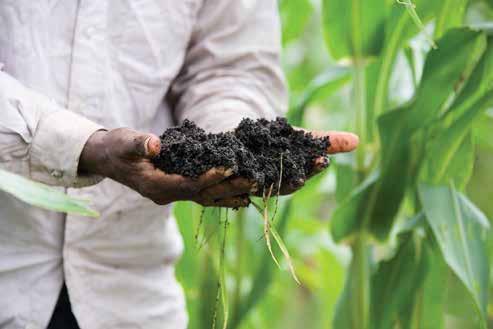
“It is happening everywhere in the in getting fertilisers, and over depen dence on inorganic fertilisers is what is have to start looking at more sustain able ways of getting fertiliser or getting making sure that that lands, our crops are fertilized. And another aspect, one thing that we can look at is organic fertilisers and we need to start devel oping them that a lot more or paying more attention to that and compost.”
UBA commemorates Earth Day with tree planting
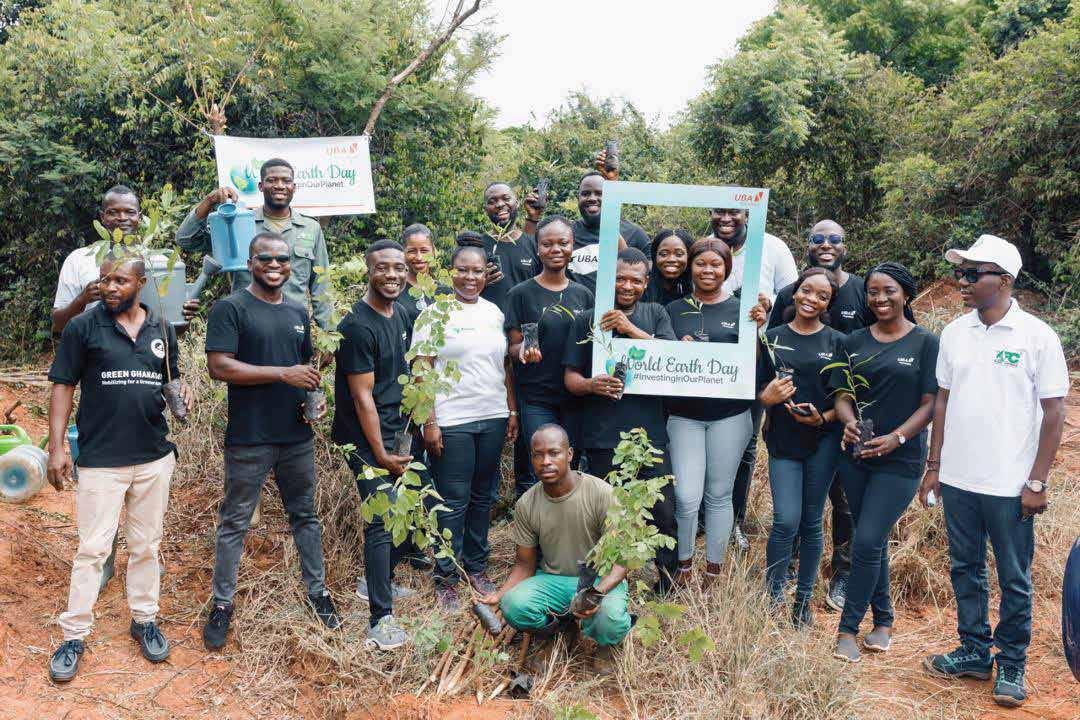

UBA Ghana participated in a Tree planting exercise at the Achimota Forest to commemorate this year’s Earth Day which falls on April 22, under the theme, “Investing in our The aim behind the initiative under the UBA Foundation is to contribute to the bank’s climatesions and reduce the overall environmental impact of its operamembers to play a part in ensuring a greener and more sustainable world for the next generation.
ment Goals (SDGs) as key pillars of the bank’s Environmental, Social, and Governance (ESG) agenda and becoming a net zero bank in its oper
ations” he said.
est in monitoring the growth of the trees and also partake in the tree planting exercise in June.
Commenting on the initiative, Head of Marketing and Corporate Communications at UBA Ghana, Henry Nii Dottey said, “As a sustainable organisation, UBA is delighted to work with the Forest

-
ry Division, Greater Accra to preserve Ghana’s forestry in a “Beyond building an undisputed services institution in Africa, UBA Ghana is committed to supporting
The UBA Foundation is committed to promoting sustainable development through various initiatives, including education, empowerment and environmental conservation. The tree planting exercise at Achimota Forest is one of several activities planned by the UBA Foundation to mark World Earth Day. The event was a reminder that small impact on the environment and the community. UBA Ghana encourages everyone to play their part in
Thursday 27 April 2023 – Investment Times 8
As global prices of inorganic fertilizer soars, Asaase Gyefo brings relief to Ghanaian farmers.
achieving the Sustainable Develop-
Division, Greater Accra who briefed the team and supervised the tree planting also commended UBA for the positive environmental act. He urged the team at UBA to take inter
2003 Year Group of Achimota Basic School gives back to mark 20th anniversary
2003 School anniversary
The Basic School has marked their 20th anniversary of leaving the school with a donation exercise on Thursday, 20th April 2023.
They presented desks, stationery items among others to the JHS Department of the school. The gesture of equipping the JHS classrooms to a modern state was aimed at giving back to the school for
Grace Gyimah, Alumni and Medical Director of Sonotech Medical Centre remarked that “Our constant interactions with the Head Mistress, Mrs. Kwarteng brought to bear some of the needs of the school including the lack of desks. As a formidable year group, we are delighted to have come back to support with these desks and transform the learning space for the JHS
opportunity to call upon other year groups to also support their alma mater.
In her acceptance speech, Mrs. Kwarteng thanked the old students advocated the need to have other year groups emulate their gesture. The Executive Board of the 2003-year group said, “the year group is
good our willing help year groups to support this positive venture.”

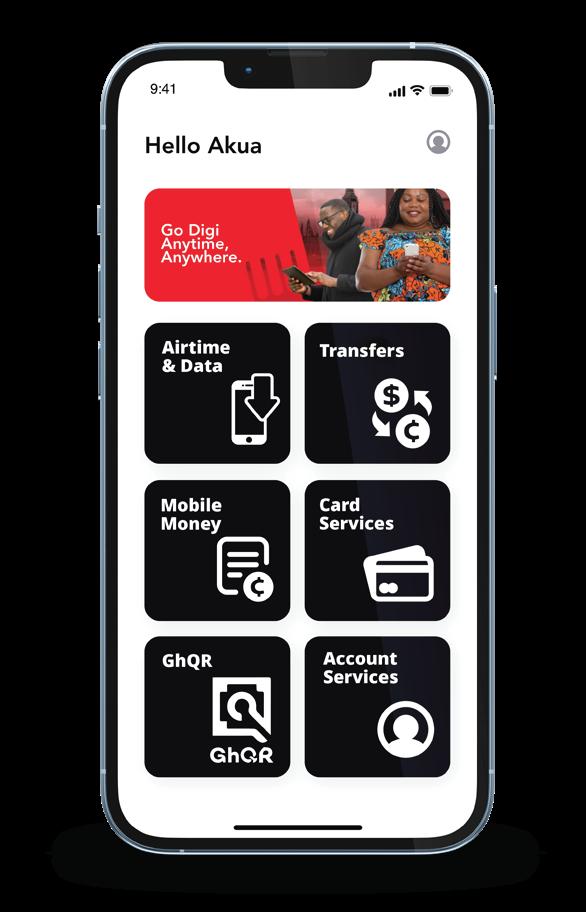
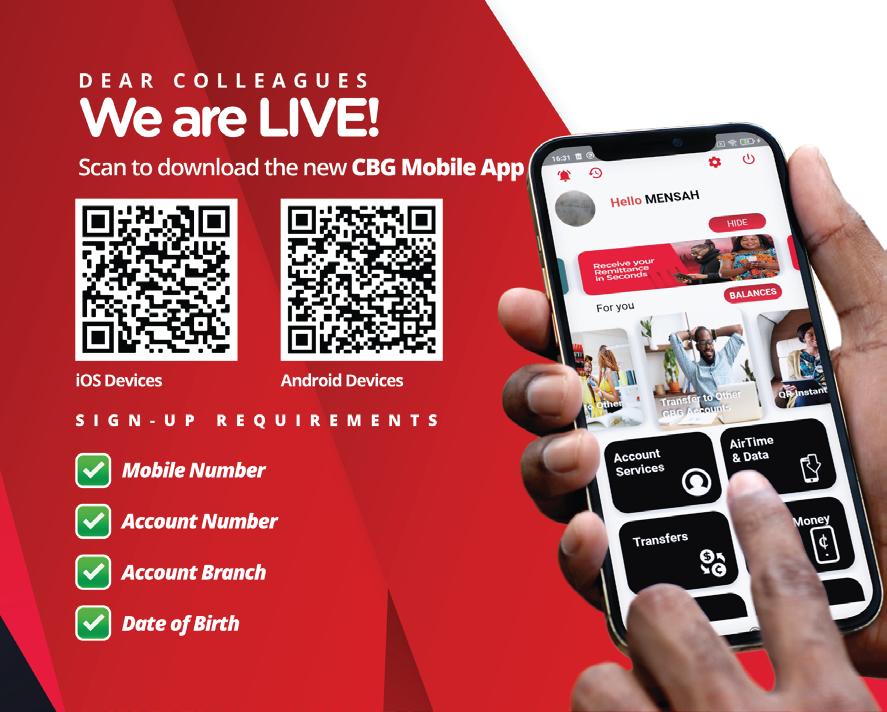
Beyond the donation exercise, the old students visited the boarding houses and interacted with the students. The visit ended with the year group singing the school anthem.
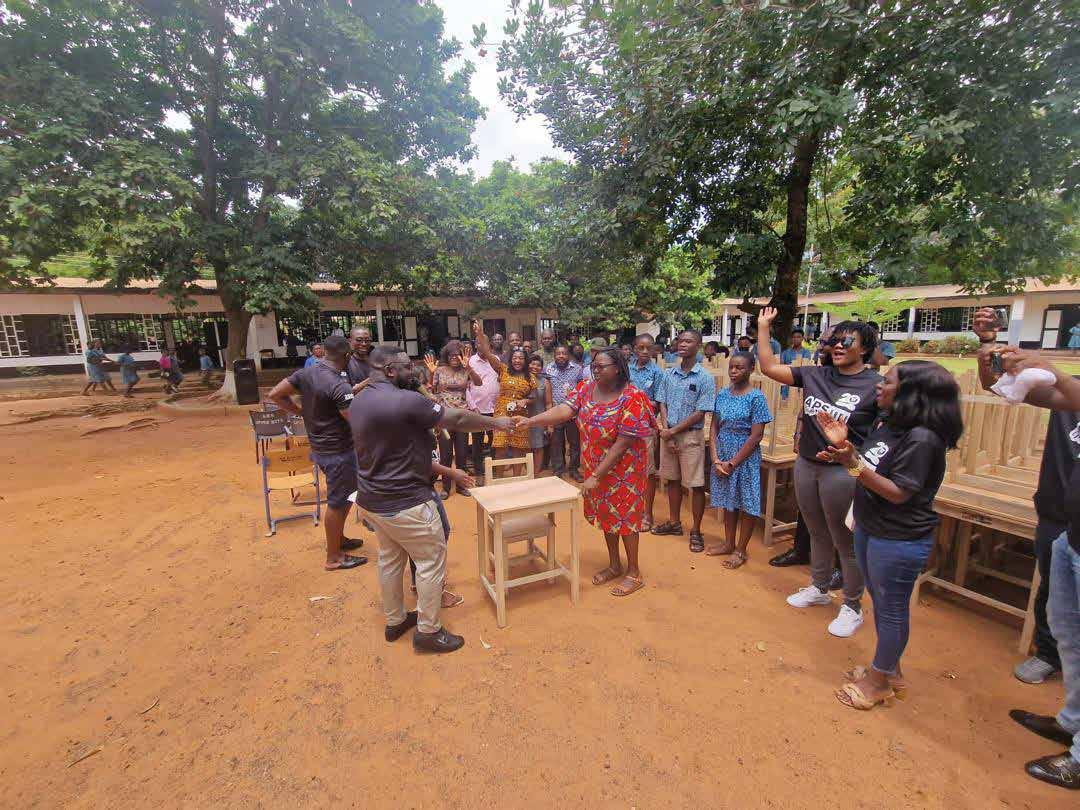
Thursday 27 April 2023 – Investment Times 9 ! ownload
Bank on the GO!
the
























Thursday 27 April 2023 – Investment Times 10 Thursd a y 26 J an uary 2 0 2 3 – In v estment T im e s 9 J anua r y 20,202 3 April 21, 2023 WEDNESDAY, APRIL 26, 2023 | NEWS 9



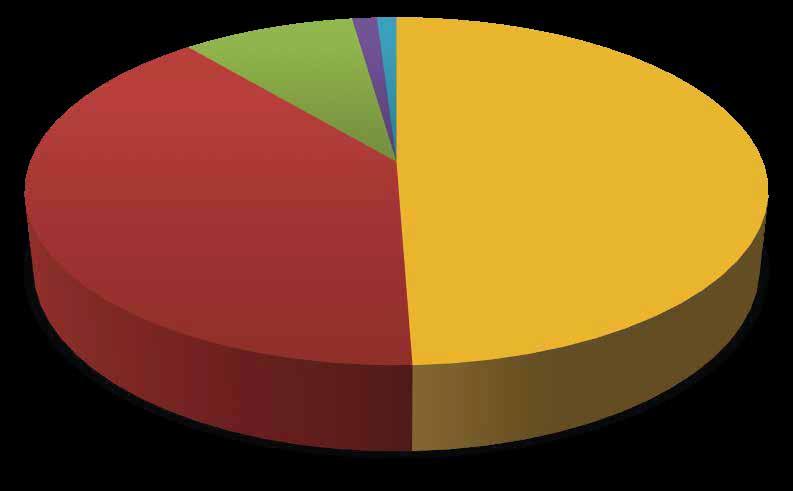
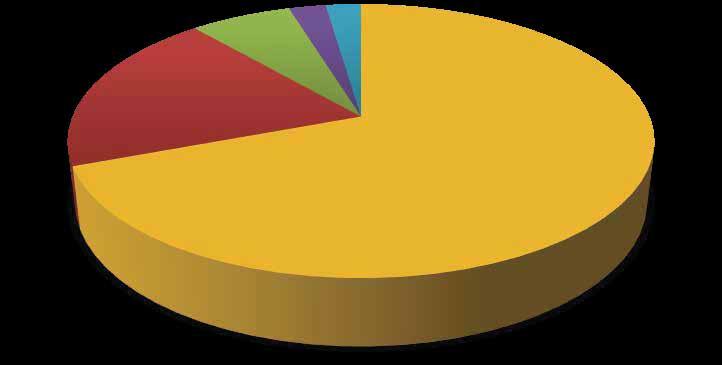






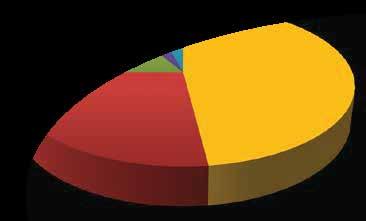




Thursday 27 April 2023 – Investment Times 11 Thursd a y 2 6 J a nu a ry 202 3 – In v estment T im e s 10 J anua r y 20,202 3April 21, 2023 WEDNESDAY, APRIL 26, 2023 10















Thursday 27 April 2023 – Investment Times 12 Thursd a y 2 6 J a nu a ry 202 3 – In v est m ent T im e s 11 J anua r y 20,202 3April 21, 2023 WEDNESDAY, APRIL 26, 2023 11 | NEWS













Thursday 27 April 2023 – Investment Times 13 Thursd a y 26 J an uary 2 0 2 3 – In v est m ent T im e s 12 J anua r y 20,202 3April 21, 2023 WEDNESDAY, APRIL 26, 2023 12 | NEWS
The week-on-week yields witnessed an overall approximated increase of 0.12bps, 0.10bps and 0.36bps across the 91, 182 and
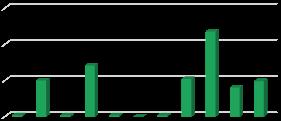

T-bills auction: Interest rates continue to rise; government gets GH¢2.53 billion.
T-bills: Government to borrow Gh¢1.96 billion this week.
GOIL Chief Operating Officer laid to rest.
Ghana’s reserve s almost empty; to end 2023 at n early 3 weeks of import cover – IMF
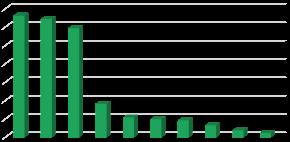
OUR SOURCES: GSE/GFIM/BOG/CSD

Thursday 27 April 2023 – Investment Times 14 Subsidiaries NTHC WEEKLY MARKET SUMMARY EDITION: 17 /23 E E S S T 1 1 9 9 7 7 6 6 NTHC Securities NTHC Trustees NTHC Registrars NTHC Commodities NTHC Properties NTHC Asset Man agement T T R R EA SU U R R Y Y B BIIL L L L M M AR R K K E E T T A A C C T TII V VIIT T Y Y A A U U C C T T IIO O N N R R E E SU U L L T T S | | T T E E ND D E E R R 1 1 8 8 4 4 7 7 | | 2 2 4 4 T T H H--2 2 8 8 T T H H A A PR R IIL L,, 2 2 0 0 2 2 3 3 Government at the j u st ended treasury bill auction announced a set
91, 182 and 364-day
However,
Securities Bid Tendered GH¢ (M) Bid Accepted GH¢ (M) Weighted Average Rate (%) 91 Day Bill 2,048.17 2,048.17 19.8635 182 Day Bill 346.60 339.54 22.5758 364 Day Bill 143.21 143.21 27.2615
target of GH¢1.958.00 billion across the
bills.
total bids amounting to GH¢2,537.98 billion was received of which GH¢2,530.92 was accepted
respectively Securities Current Yield (%) Previous Yield (%) Change (bps) 91 Day Bill 19.8635 19.7444 +0.1191 182 Day Bill 22.5758 22.4709 +0.1049 364 Day Bill 27.2615 26.9020 +0.3595 E E Q Q U UII T T Y Y M M A A R R KE T T AC C T T IIV VIIT T Y Y | 1 1 7 7 TH A A P P R R – 2 2 1 1 S T T APR,, 2 2 0 0 2 2 3 3 Days Date Volume Value GH¢ GSE Composite Index (GSE- CI) Monday 17/04/23 217,207 507,132.31 2,664.60 Tuesday 18/04/23 104,442 134,967.61 2,664.60 Wednesday 19/04/23 50,810 64,072.74 2,664.60 Thursday 20/04/23 29,168 22,617.57 2,664.23 Friday 21/04/23 115,860 279,592.68 2,735.58 G G SE E S T T O O C C K K IIN N D DII C C E E S | | 2 2 1 1 S S T AP R RIIL L,, 2 2 0 0 2 2 3 3 INDICES YEAR START (01/01/2023) CURRENT (21/04/2023) YEAR-TO-DATE CHANGE (%) GSE Composite Index (GSE -CI) 2,443.91 2,735.58 +0.12 GSE Financial Stock Index (GSE -FI) 2,052.59 1,756.32 -0.14 C C URR R E E N N C C Y M AR R K K E E T A A C C T TIIV VII T T Y Y | | 2 2 1 1 S T T AP P R RIIL L ,, 2 2 0 0 2 2 3 3 Currency Currency Pair Buying Selling US Dollar USD-GHS 10.9386 10.9496 Pound Sterling GBP-GHS 13.5726 13.5884 Euro EUR-GHS 12.0080 12.0198 Japanese Yen JPY -GHS 0.0814 0.0815 Naira NGN-GHS 42.0729 42.1807 South African Rand ZAR-GHS 0.6049 0.6055 M M A A R R KE T T T T R R A A D D E E A A CT TII V VIIT TII E E S S | | 1 1 7 7 TH A P P R R –– 2 2 1 1 S T T APR,, 2 2 0 0 2 2 3 320 40 60 80 100 120 140 In '000s Top Ten Equity Trades5 10 15 20 25 In '000,000s Bond Traded Coupon Curve50 100 150 In '000,000s Bond Value Traded
364-day bills
N N E E W W S H HIIG G H H L LIIG G H H T T S S


PUBLISHED BY INVESTMENTTIMES EDITOR: BENSON AFFUL PHONE +233 54 551 6133 MAIL info@investmentimesonline.com ADDRESS Plot 91 Baatsona | Spintex - Accra Thursday 27 April 2023 – Investment Times A N E W T HINKI N G





























































